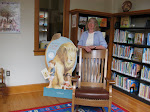I can already hear your sighs and see your eye’s rolling. What will she come up with next? Learning history though Science Fiction, really! And no I’m not thinking of alternative history, or what our world would be like if Abraham Lincoln hadn’t been assassinated or Germany hadn’t lost World War II. Although, those are interesting questions that some science fiction/fantasy novels do contemplate. No, what I’m thinking about is Connie Willis’ latest time travel novel, Blackout.
I’m a big Connie Willis fan, so maybe I’m biased, but reading this novel actually got me excited about history. I’m not big into history, or even historical novels. It all seems so dry to me. Yet, several of Connie Willis’ novels are about a group of historians in Oxford, England, who study history by experiencing it first hand. They have the ability to time travel, through a “net”, which can place them in a different time and place. The rules are that historians can only observe. They can’t do anything that might change history.
So in The Doomsday Book, our fearless historians go to the Middle Ages and try not to die of the bubonic plague. In To Say Nothing of the Dog, the book that got me hooked on Connie Willis, they travel to Victorian England and spend time boating on the Thames. Willis’ latest, Blackout, sends a group of historians to World War II England, where the get stuck during the Blitz. The books narrative, the descriptions of London during the Blitz, and the way people endeavored to live normal lives in complete chaos were absolutely gripping. I came away from the novel thinking, I need to know more about this. I need to know about the lives of ordinary people, trying to live ordinary lives, in trying and extraordinary times. I haven’t done it yet, but maybe, I’ll just check out some real history.
Historical fiction, and in this case science fiction, make history come alive because they tell history from the point of view of people. Characters who leap off the page and make us care about them deeply. Good non-fiction does the same. Whenever someone marvels about a non-fiction book that reads like fiction, you know it’s by an author who knows the importance of story and telling a good one. How accurate Willis’ description is, I can’t really say. But my trust in Connie as an author makes me willing to bet she did her homework.
I often hear adults bemoan that all their children or grandchildren want to read is fantasy or science fiction. “I want them to read something better,” I hear. Well, I could argue that there really isn’t anything better, but what I usually argue is that “reading begets reading.” If something grabs them, let them read it. Who knows what it will make them read next. After all, Connie might just might get me to read some history, because the lives of the British during World War II has come alive for me in her writing.
My only real complaint is that part two doesn’t come out till fall. So, I won’t find out what happens to my fearless Oxford historians, Polly, Mike and Merope, until October. I guess I’ll just have to find something else to read in the meantime.


